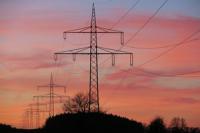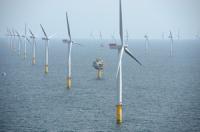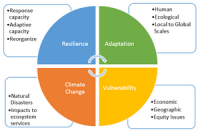-
Detecting radioactive material remotely
Physicists have developed a powerful new method to detect radioactive material. By using an infrared laser beam to induce a phenomenon known as an electron avalanche breakdown near the material, the new technique is able to detect shielded material from a distance. The method improves upon current technologies that require close proximity to the radioactive material.
-
-
Rapidly melting tall ice-cliffs may trigger faster sea-level rise
Glaciers that drain ice sheets such as Antarctica or Greenland often flow into the ocean, ending in near-vertical cliffs. As the glacier flows into the sea, chunks of the ice break off in calving events. Although much calving occurs when the ocean melts the front of the ice, and ice cliff above falls down, a new study presents another method of calving: slumping. And this process could break off much larger chunks of ice at a quicker rate.
-
-
Modernize the energy grid software

The grid is an intricate, highly complex system. One that has gotten even more complex with the increasing use of renewable energy resources like wind and solar. At some point, something will go wrong. A line will get cut. A generator will fail. There might be a hurricane or a cyberattack. How do you quickly correct for that failure to avoid a cascading blackout?
-
-
Offshore wind energy potential not exploited by U.S. energy companies

When it comes to wind energy, the United States is sitting on a gold mine, so to speak. It’s a moment of untapped potential that, if harnessed properly, could transform the way the U.S. uses energy, one expert says.
-
-
Geothermal plant caused South Korea’ 2017 tremor
A rare earthquake in South Korea was triggered by the country’s first experimental geothermal power plant, government officials said Wednesday. The southeastern port city of Pohang was rattled by a 5.4-magnitude earthquake in November 2017— the second-most powerful tremor ever in the normally seismically stable South.
-
-
Mitigating impact of rising seas, storms along California’s coast
New coastal modeling research presents state, federal, and commercial entities with varying storm and sea level-rise scenarios to assist with planning for future infrastructure and mitigation needs along the California coast.
-
-
Droughts caused permanent loss to major California groundwater source
California’s Central Valley aquifer, the major source of groundwater in the region, suffered permanent loss of capacity during the drought experienced in the area from 2012 to 2015.
-
-
A new way to sense earthquakes could improve early warning systems

Every year earthquakes worldwide claim hundreds or even thousands of lives. Forewarning allows people to head for safety and a matter of seconds could spell the difference between life and death. Researchers demonstrate a new earthquake detection method — their technique exploits subtle telltale gravitational signals traveling ahead of the tremors. Future research could boost early warning systems.
-
-
Wastewater treatment plants spread antibiotic resistance
The products of wastewater treatment have been found to contain trace amounts of antibiotic resistant DNA. These products are often reintroduced to the environment and water supply, potentially resulting in the spread of antibiotic resistance.
-
-
Easier access to radioactive waste
At the Hanford Site, waste retrieval has been completed in 17 of 149 large concrete underground single-shell tanks. The tanks were constructed of carbon steel and reinforced concrete between 1943 and 1964 to store a radioactive mix of sludge and saltcake waste from past nuclear processing activities. Hanford is installing new access holes in the tank domes for future retrieval efforts.
-
-
China's Huawei sues U.S. government over ban

Chinese tech giant Huawei has sued the U.S. government, arguing that legislation Congress passed last year that restricts its business in the United States is “unconstitutional.” The case, which analysts see more as a public relations move, is but the latest in an intensifying effort by the telecommunications company to fight U.S. security concerns, which Huawei argues are unfair and unfounded.
-
-
Forecasters use Iron Dome science to handle disasters

Typhoons, floods, droughts, earthquakes, hurricanes, wildfires — the frequency and intensity of natural disasters across the globe are worsening, and these deadly events could continue plaguing the planet as a result of climate change. Iron Dome tech firm uses rocket science to enable utilities to plan for and manage effects of wildfires, storms, hurricanes and earthquakes.
-
-
Using concrete for space colonies
“Be prepared.” This famous mantra isn’t just for the Boy Scouts of America. The need to build durable infrastructure on other planets is coming, and we must be ready. To prepare, researchers have been exploring how cement solidifies in microgravity environments.
-
-
“Clustering” land buyouts could improve flood resiliency after Hurricane Harvey
A new study analyzes flood loss claims and estimates from over 74,000 properties impacted by Hurricane Harvey in Houston’s Harris County. The study finds that a strategic land buyout approach that prioritizes the purchase of land parcels in ‘clusters,’ as well as proximity to existing open space, is just as cost-effective as the traditional, piecemeal approach but with major added ecological and social benefits.
-
-
Resilience and adaptation strategies can address the impacts of climate change

By the end of this century, Chicago could face the kind of searing summer heat that Las Vegas sees now. Phoenix could hit 110 degrees, 60 or more days a year. That’s not wild speculation. It’s the official position of 13 federal agencies on climate change, released late last year with a warning: Local governments need to do more to prepare. Every road they build, every storm drain they put in, will have to hold up under conditions that modern civilization has never seen. How do you plan for that? Researchers at RAND have been working on that problem for a while now.
-
More headlines
The long view
Water Wars: A Historic Agreement Between Mexico and US Is Ramping Up Border Tension
As climate change drives rising temperatures and changes in rainfall, Mexico and the US are in the middle of a conflict over water, putting an additional strain on their relationship. Partly due to constant droughts, Mexico has struggled to maintain its water deliveries for much of the last 25 years, deliveries to which it is obligated by a 1944 water-sharing agreement between the two countries.
Trump Is Fast-Tracking New Coal Mines — Even When They Don’t Make Economic Sense
In Appalachian Tennessee, mines shut down and couldn’t pay their debts. Now a new one is opening under the guise of an “energy emergency.”
Smaller Nuclear Reactors Spark Renewed Interest in a Once-Shunned Energy Source
In the past two years, half the states have taken action to promote nuclear power, from creating nuclear task forces to integrating nuclear into long-term energy plans.
Keeping the Lights on with Nuclear Waste: Radiochemistry Transforms Nuclear Waste into Strategic Materials
How UNLV radiochemistry is pioneering the future of energy in the Southwest by salvaging strategic materials from nuclear dumps –and making it safe.
Model Predicts Long-Term Effects of Nuclear Waste on Underground Disposal Systems
The simulations matched results from an underground lab experiment in Switzerland, suggesting modeling could be used to validate the safety of nuclear disposal sites.
